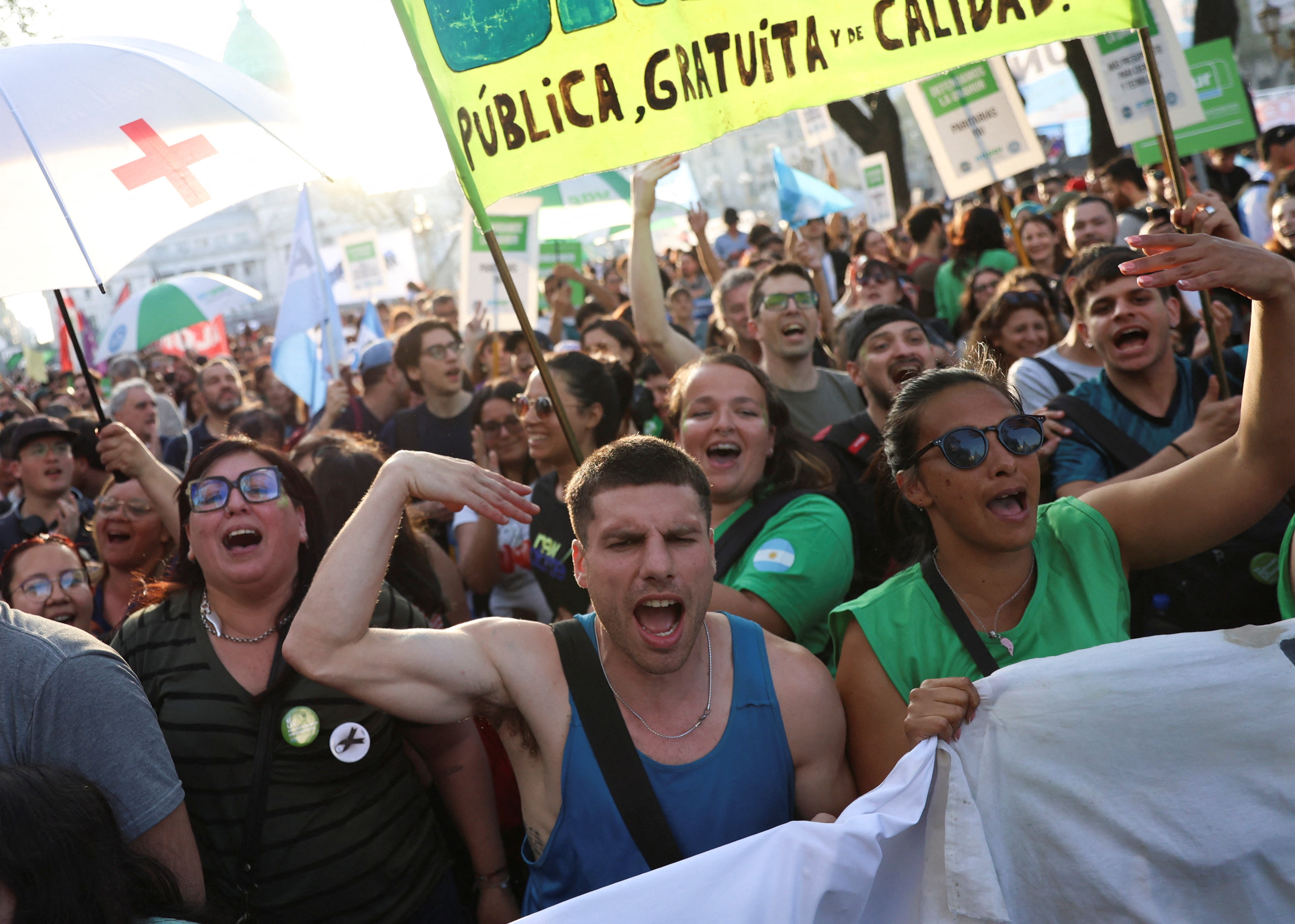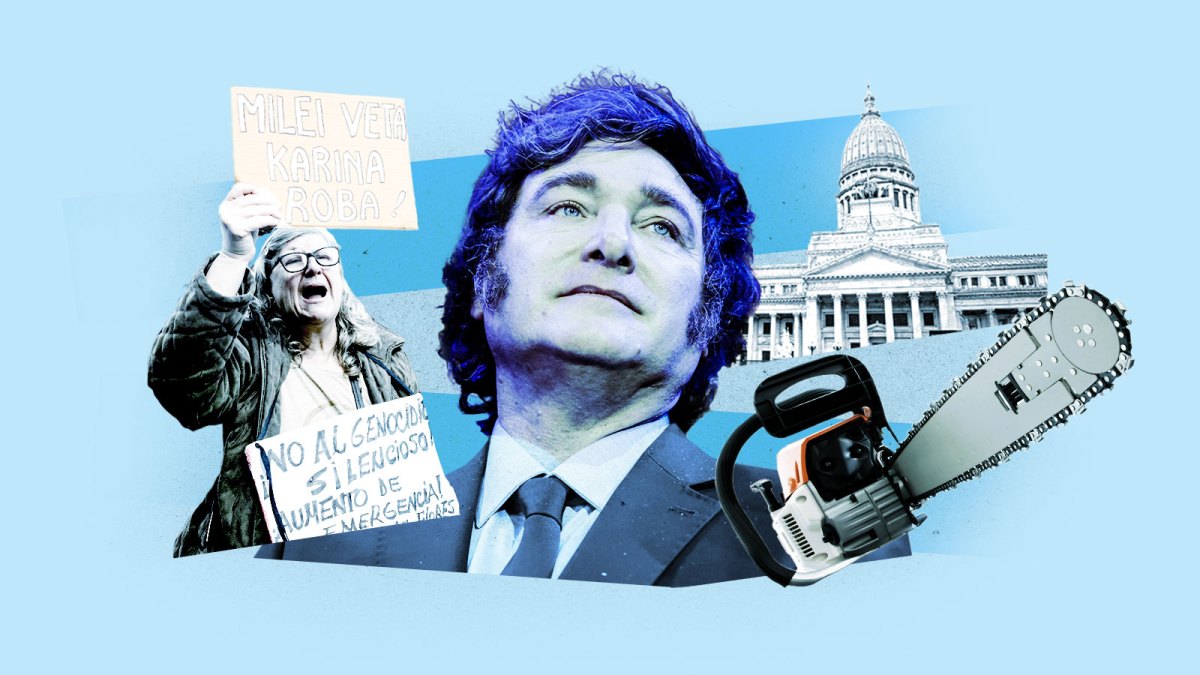For the global right, he is an icon, a rockstar president taking a chainsaw to government spending. Elon Musk called him a “beacon of hope”. Donald Trump hailed him as a “hero”. Kemi Badenoch sees him as the “template” for all conservative leaders.
But back home it is a far more complicated picture for President Milei of Argentina, who has just been through the worst fortnight of his 21 months in office. A corruption scandal is circling around the powerful general secretary to the presidency, his sister. His disapproval rating this week jumped to 54 per cent according to a survey published by AtlasIntel. And in key provincial elections, held on September 7, his “Liberty Advances” political party was roundly defeated by a coalition of the country’s Peronist opposition, whose big state ideology is the antithesis of the Milei model.
Investors are taking fright. The Buenos Aires stock market, which last year soared nearly 70 per cent, is the worst performing index in the world this year, down by one third. The local currency, the peso, is also under immense pressure. Over just three days last week the central bank blew over one billion dollars of its dwindling $20 billion liquid reserves trying to prop it up, with only limited success.
Milei, who will be meeting President Trump in New York on the fringes of the United Nations general assembly on Tuesday, is seeking an emergency credit line from the United States’ exchange stabilisation fund, a reserve dating from the 1930s which can make international loans when deemed in the interests of the US. His success or otherwise will be a key test of how far Trump is prepared to go to support his South American “hero”.
The two allies have very different personalities. Milei has never sold himself as a dealmaker. His core belief is that compromise is failure. On Tuesday, he was in Paraguay, the star guest at what was billed by organisers as the world’s most important conservative summit: the Conservative Political Action Conference, or CPAC. Milei told his audience of the faithful that, in his view, Argentina faced a clear choice: more liberalisation or bust. There can be, he said, no “third way”.
“There is free enterprise capitalism, and there is socialism.” he said. “Any intermediate solution leans towards socialism; and that means poverty.”

A march in Buenos Aires on Wednesday in defence of public health services after President Milei vetoed laws to boost funding for hospitals and universities
FRANCISCO LOUREIRO/REUTERS
It was that same blunt message which led millions of Argentinians to take a risk with the political outsider, who most then knew only as an eccentric TV pundit, when they elected him in 2023. The outgoing government of Alberto Fernández, like many of his predecessors in a country which holds the world record for sovereign defaults, had been one in which the economy spiralled towards chaos.
Inflation was approaching 200 per cent. Anyone holding savings in the local currency, the peso, was seeing its value slump by the day. Milei promised, via a slick social media campaign featuring his trademark chainsaw, that unleashing the market from almost all restrictions would make everyone better off.
The Peronists fight back
He made some outlandish promises along the way including that he would “burn down” the central bank and allow his permissive free market approach to extend to human organs. Both were shelved once he took office. As was a more believable pledge to dollarise the economy: Argentina does not have the dollar reserves to do that.
• Is Javier Milei’s chainsaw revolution working?
But he has achieved two of his more sober ambitions: that he would tame inflation and balance Argentina’s books. Prices are now rising at a rate of about 30 per cent a year. In June, the country posted a fiscal surplus for the first time in 14 years.
The president has also closed nine of 18 ministries, mostly by merging them into other departments. The government says 48,000 public sector workers have been dismissed since it took office, resulting in a saving of about $1.85 billion (£1.35 billion) a year. The state news agency has been shut.
For Milei, all the above are successes which would help convince him that a vote on September 7 for representatives in the parliament of Buenos Aires province — which has a territory almost the size of Poland and is home to about 40 per cent of the country’s population — would be the “final nail in the coffin” of the left in Argentina.

President Milei has long proved a divisive figure and there have been weekly protests in the Argentinian capital
FRANCISCO LOUREIRO/REUTERS
He was mistaken. The result — 47 per cent of support going to the Peronist parties and 34 per cent to Milei’s alliance — was met with “shock” inside the government, said Jorge Liotti, political editor of La Nacion newspaper.
Others were less surprised. Under a limestone arch of Buenos Aires’ monumental Retiro Mitre railway station, an Edwardian neo-baroque masterpiece that opened in 1915, when Argentina was one of the richest per capita countries in the world, Mario Norberto was sitting at his bookstall.
He voted for Milei in the 2023 election. Asked how business was going, he put his hands to his throat, to simulate strangulation.
“OK, the president lowered inflation. All good. But is that it?” He complained that wages remained so low that any upside of stable prices was not being felt by most people. “In Argentina, every month has only 20 days,” he said, a popular expression meaning pensioners and those on low wages struggle to find the money to make do by the end of the month.
Inflation success a ‘mirage’
That chimes with an often-heard criticism of the president in this city: that his success in reducing inflation has been something of a mirage.
• Can Kemi Badenoch sell Mileinomics in Britain?
Carlos Maslatón, a lawyer and financier, spends most of his days trading on international markets while bashing out social media posts from his art deco apartment on an upper floor of the 1930s Kavanagh skyscraper, once the tallest building in Latin America. He is a fierce critic, from the right, of Milei.
His view is that the government’s positive inflation figures have been achieved not via deep economic reform, but by the central bank artificially propping up the peso. “The government is effectively paying the people to keep their pesos to reduce demand for US dollars,” he said. “This policy in Argentina always ends in collapse,” he warned.
The strength of the peso is producing several side effects and is a complete reversal of the situation just three years ago. Then its value on the black market slumped, making Argentina seem extremely cheap to tourists and imports seem prohibitively expensive to Argentinians. Now it is the other way round.

Karina Milei, the president’s sister and confidente, has become the focus of growing public anger
DIEGO LEVY FOR THE TIMES
“All my rich Argentinian friends are out of here — shopping in Miami and hitting the beaches of Brazil,” said Johnny Falkner, an American entrepreneur who was taking in the spring sunshine with friends in a bar in the upmarket Recoleta neighbourhood. “A good French wine is the same price as a Malbec. It is ridiculous,” he said.
‘They are all thieves’
Falkner then raised another issue which has been the subject of intense gossip in recent weeks and risks further eroding the president’s popularity. “What’s going on with the sister?” he asked.
He was referring to an explosive scandal that emerged last month linking Karina Milei, the president’s younger sister and chief adviser, to a bribery network.
In a telephone recording leaked to local media, the head of Argentina’s disability agency, Diego Spagnuolo, a former close friend of the president, can be heard talking about pharmaceutical companies allegedly paying bribes for contracts. “I think 3 per cent goes to Karina,” he said in the recording. “You know that they’re stealing.”
Milei has since fired Spagnuolo and claimed “everything he said is a lie”. But the allegation, even if false, has brought reputational damage to the president, who convinced voters in 2023 that only he could rid the “swamp” of Argentinian politics of corruption.
Mateas Spinetti, a Buenos Aires taxi driver and former Milei supporter, said: “When I heard that recording I decided that I am never going to vote again. They are all thieves.”
The president refers to his sister as “the boss” and despite her scant qualifications — ten years ago she was best known for selling cupcakes via social media — she acts effectively as the vice-president. She also often takes the role of first lady to the unmarried president, accompanying him on most of his foreign trips.
The two have been exceptionally close since childhood, when Karina is understood to have helped protect her brother from the tantrums of his father, according to one biographer. In 2023 he said she was “the most wonderful being in the whole universe”.
But that is not a view shared by most Argentinians, almost 60 per cent of whom think Karina should resign, according to one survey.
Milei’s unusual personality — he has four cloned dogs named after monetarist economists, as well as his close dependence on his sister — has led some to question how well he might cope if the going gets really tough in the remaining two-and-a-half years of his mandate.
Rafael Bielsa, a former foreign minister and ambassador, knows Milei better than almost anyone from the Peronist wing of Argentinian politics. They worked together in a Buenos Aires-based conglomerate, Corporación América, for over a decade before Milei entered politics. The future president worked in the company’s corporate risk department.
Bielsa, while strongly opposed to almost all his ex-colleague’s political positions, stressed that the man he once knew was a consistently excellent employee. “Serious, hardworking, obsessively hard working,” he said.
Asked if he saw any flaws in Milei’s character, he did point to one. “He doesn’t understand defeat …when he loses, he just doubles his bet.” The diplomat warned that such a strategy, perhaps acceptable in the financial world, is dangerous in government.
Why? Because in Argentina, he said, “our tolerance has its limits”.

